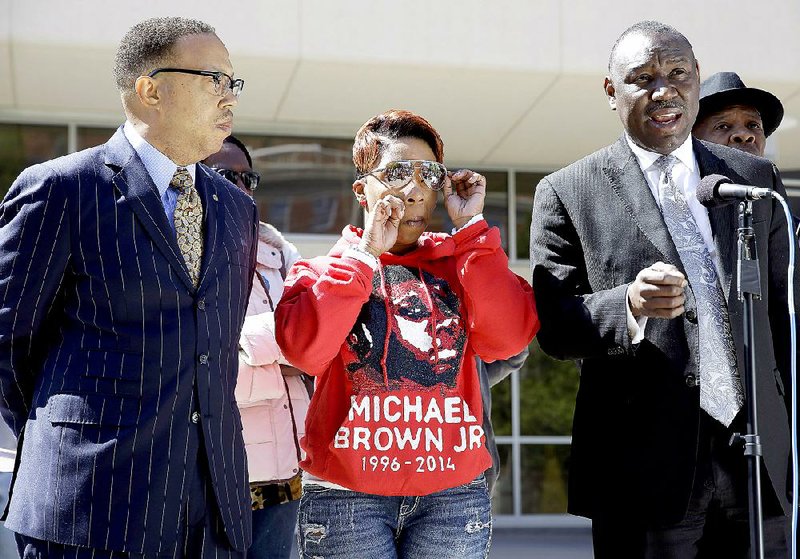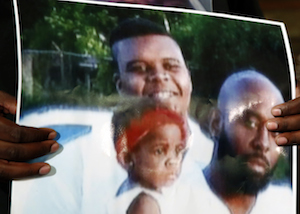CLAYTON, Mo. -- Michael Brown's parents filed a wrongful-death lawsuit Thursday against Ferguson, Mo., opening a new chapter in the legal battle over the shooting that killed their son and sparked a national protest movement about the way police treat blacks.
Attorneys for Brown's parents promised the case would shed light on new forensic evidence and raise doubts about the police version of events. Some of that evidence, they said, had been overlooked in previous investigations.
"The narrative of the law enforcement all across the country for shooting unarmed people of color is the same: That they had no other choice," attorney Benjamin Crump said. "But time and time again, the objective evidence contradicts the standard police narrative."
Brown's parents, Lesley McSpadden and Michael Brown Sr., attended a news conference announcing the lawsuit outside the St. Louis County Courthouse. A tear rolled down McSpadden's cheek as Crump spoke.
"It's all part of the journey," she said.
The case had been expected for months. If it goes to trial, the lawsuit could force a full review of all the evidence in the shooting and gather key witnesses to be questioned in open court, including Darren Wilson, the white officer who shot Brown. Wilson and former Ferguson Police Chief Tom Jackson also are named in the complaint.
Civil cases generally require a lower standard of proof than criminal cases. Jurors must base their decision on a preponderance of evidence, not proof beyond a reasonable doubt, which is the standard needed to convict in a criminal trial.
A Ferguson city spokesman declined to comment, citing the pending litigation. Messages left for an attorney for Wilson were not immediately returned.
Jackson declined to discuss the lawsuit, saying he had not had a chance to review the allegations.
Brown, 18, was unarmed and walking in the street with a friend Aug. 9 when Wilson told them to move to the sidewalk.
The lawsuit alleges that Wilson cursed at the two as he told them to get out of the street, causing tension to escalate. Without the "unnecessary and unwarranted profane language," the encounter would have been "uneventful," it says.
Moments later, Wilson and Brown became involved in a scuffle through the open window of Wilson's police vehicle. Wilson shot Brown after the scuffle spilled into the street.
Some witnesses said Brown appeared to be trying to surrender, but Wilson said Brown was moving toward him aggressively, forcing him to shoot.
The attorneys said they planned to cite Wilson's own initial comments to a supervisor in which, according to the lawsuit, he said Brown had his arms raised moments before the shooting.
Brown's death led to weeks of sometimes-violent demonstrations and spawned a national movement seeking changes in how police deal with minority-group members. In the end, local and federal authorities ruled that the shooting was justified.
A St. Louis County grand jury and the U.S. Justice Department declined to prosecute Wilson, who resigned in November. But the Justice Department released a report citing racial bias and racial profiling in the Ferguson Police Department and in a profit-driven municipal court system that frequently targeted blacks.
After the report, several city officials resigned, including Jackson, the city manager and a municipal judge. The municipal court clerk was fired over racially biased emails, and two police officers resigned over similar emails of their own.
Crump and another attorney for the family, Daryl Parks, said the lawsuit will include evidence that was ignored by the grand jury and the Justice Department, including bullets allegedly fired by Wilson found in buildings.
Wrongful-death lawsuits have been filed in other recent high-profile cases.
In New York, the family of Eric Garner is seeking damages. Garner, who was black and had asthma, died in July after a white, plainclothes officer applied what a medical examiner determined was a chokehold. Garner was accused of selling loose, untaxed cigarettes on a city street.
Information for this article was contributed by Jim Suhr of The Associated Press.
A Section on 04/24/2015


